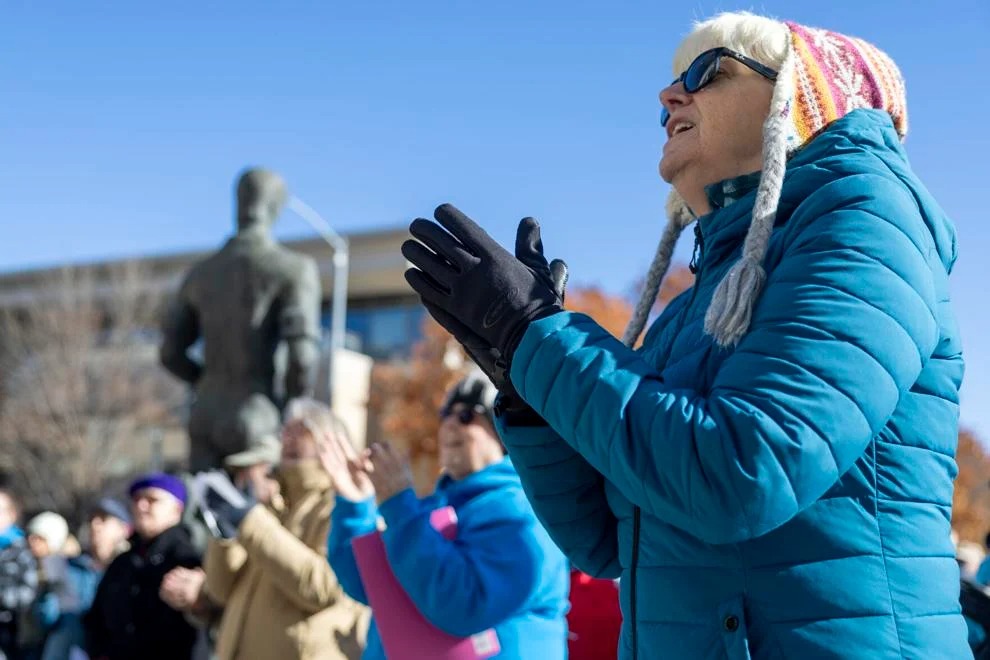By Margaret Reist, Lincoln Journal Star
A group of faith leaders and members of a grassroots group called Justice in Action continued their efforts Thursday to convince the Lancaster County attorney to expand existing diversion programs.
About 100 people gathered outside the Hall of Justice and, holding a banner that read “Divert, Don’t Detain.” They also sang the spiritual “I Shall Not be Moved” and unrolled a scroll with about 300 signatures inviting County Attorney Pat Condon to their assembly in May that about 1,200 people attended last year.
“Let us remember as we stand here on this fall morning that our call to justice transcends boundaries,” said Rev. Kirstie Engle of First United Methodist Church. “In these times of division and strife may our solidarity shine brightly throughout this city as a beacon of hope.”
Justice in Action is a nonprofit made up of 26 local faith organizations. It was created in 2022 with seed money from the Great Plains Conference of the United Methodist Church, which is working with national experts to build a network of nonprofit justice organizations across Nebraska and Kansas.
Rev. Tobi White, of Our Saviour’s Lutheran Church, said more than 500 people will “needlessly spend the holiday behind bars” in the county jail, many waiting for trial on a nonviolent offense, others with drug or alcohol issues, or mental health challenges. The jail population costs taxpayers $60,000 a day, she said.
“We’re here to remind County Attorney Condon and his staff that they have the power to change this system,” she said.
The group is advocating for changes that could expand the county’s pre-trial diversion programs, including eliminating or extending the 90-day deadline to apply, allowing those charged with misdemeanors or nonviolent felonies to participate and eliminating fees.
Justice in Action is championing other changes, including creating a mental health navigation system to help people more easily find the services they need and organizing a public education effort to reduce the stigma around mental health problems; and addressing affordable housing issues by creating an eviction mediation process.
But much of the public attention has been focused on Condon, who has not attended either of the group’s assemblies. Last year, when Condon did not attend, Justice in Action staged a rally outside the Hall of Justice.
Condon said he had told organizers he couldn’t attend last year because he was attending a Nebraska County Attorney Association spring conference where one of his deputy county attorneys was receiving an award.
On Thursday, following the rally, 14 leaders went to his office and dropped off the invitation. They were told he was in a deposition.
The group leaders have had ongoing meetings with several county officials, including Condon, to track progress, according to information the group provided. In March, they met with Condon, who didn’t agree to any of the changes for which they’re advocating.
Reached later Thursday, Condon said he’d do his best to get to the group’s May assembly.
He said he’s met with group leaders several times about their pretrial diversion requests and has told leaders that if they can show him evidence that waiving the application period is a best practice he’d consider it.
“I’m not going to agree to something unless you show me a reason for it,” he said.
As for eliminating fees, Condon said that now, if people can’t afford the fees, the county waives them. And for some people, paying fees can make them feel like they’ve got “skin in the game” and are more likely to be successful.
There are guidelines for allowing people facing misdemeanors and some felonies to participate, and he said he’d rather have some flexibility to consider individual cases rather than rigid guidelines. What is considered a nonviolent felony is subjective, he said.
According to Justice in Action, nearly 70% of people held in jail are pretrial cases, though some of those people are serving sentences on other charges, and there’s a gap between the people referred into Community Corrections programs and those ultimately admitted.
And many of those who remain in jail can’t afford bond, White said.
“This is not justice, it’s punishment for poverty,” she said.
Overcrowding at the jail has been a problem for some time, and County Corrections has had to contract with other counties to house some female inmates. The Lancaster County Board hired Omaha-based HDR Consulting and the Nebraska Center for Justice Research, part of UNO’s School of Criminology and Criminal Justice, to do an assessment of the county’s criminal justice system and offer recommendations to reduce overcrowding.
Corrections and Community Corrections have begun a number of reentry and other programs to try to reduce recidivism and keep fewer people from being incarcerated.
View the original story here.






